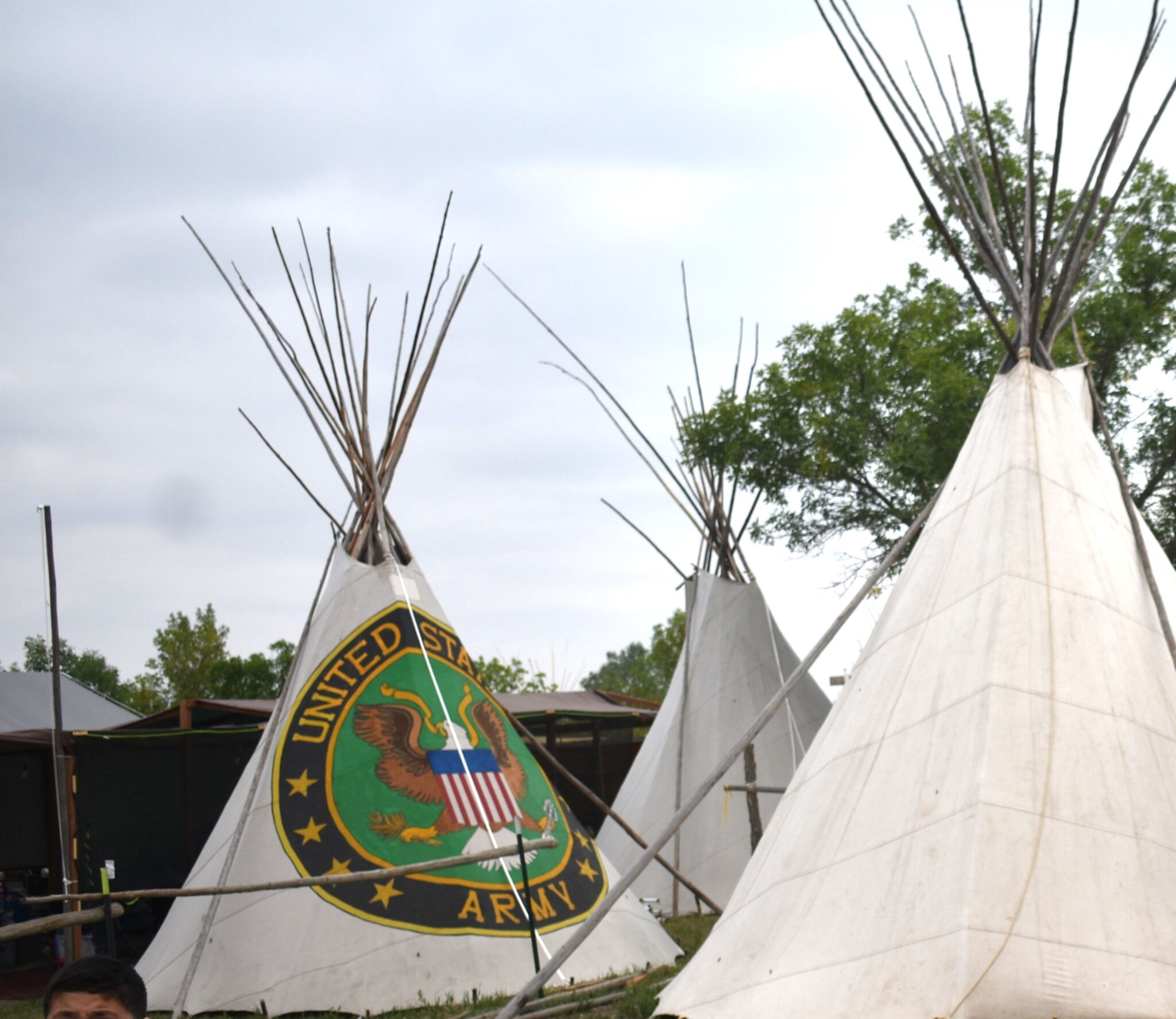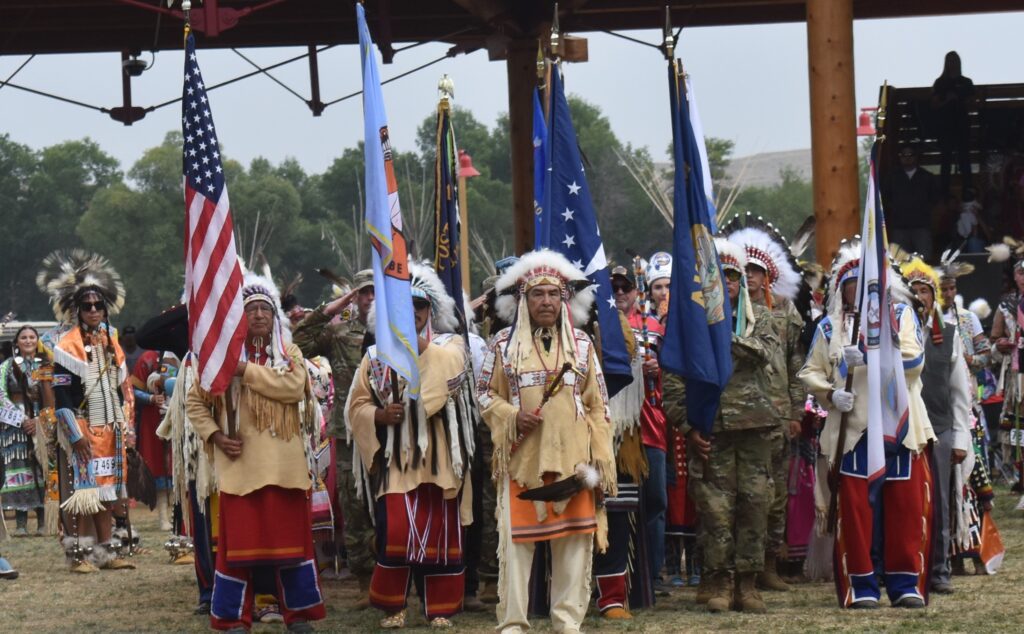News
History: Native American Code Talkers and War Heroes

While not specifically Wyoming history, the events of the World Wars impacted our little corner of the world. One important part of war is making sure the enemy does not know what the allied troops are planning. Messages are relayed via ‘codes’, but the problem with codes is that they can and often are broken by the enemy. Except for Native American languages.
In the movie, Windtalkers, in which is based on the Navajo Code Talkers in WWII, Nicholas Cage plays a Marine Corporal who is charged with keeping the Navajo code talkers, Pvt. Ben Yahzee and Pvt. Charlie Whitehorse, safe.
Although the Navajo Code Talkers were the most well-known of the code talkers, the first code talkers were Choctaw Indians from the 142nd Infantry Regiment, 36th Division in France in WWI. Several other tribal members served as code talkers, including members of the Ho-Chunks, Eastern Cherokees, Comanches, Cheyenne, Yankton Sioux, and Osage tribes.
One reason the code talkers were successful, is the fact that the Naive American languages are so different from European languages.
In a talk at Kearney Hall on June 16, 2022, about the Arapaho Language, Professor Andrew Cowell, chair of the University of Colorado Department of Linguistics. He talked about how to pronounce some of the Arapaho words, and how difficult it is to learn the language, as it is so different from English. He talked about the Lewis and Clark Expedition, and how it was difficult to translate the Native Languages.
He said that if one didn’t grow up learning a language like Arapaho, it is very hard to learn it. It is tough to translate from Arapaho to English as many times the Arapaho language does not actually have a word for something as the English language does. Other Native languages are similar, so it is a much more difficult code to crack.
Other than Code Talking, Native American’s have contributed greatly to America in many of our country’s wars. They fought in the Revolutionary War, War of 1812, Civil War, World Wars I and II, Vietnam and other conflicts. Many have been heroes as well.
This from the January 16, 1920, Thermopolis Independent, about their contribution in WWI. – Indians’ Part In War Told – Commissioner Recites Deeds of 10,000 American Indians Who Fought Kaiserism. Many Played Hero Roles Washington.—There are 333,702 Indians in the United States, exclusive of Alaska, according to Cato Sells, commissioner of Indian affairs, who has just made public his annual report to the secretary of the Interior…..Probably nothing is of greater interest in the report than the chronicle of the part the Indians played in the war, and the benefit military service has proved to them…..
“Probably nothing more helpful has come to this ancient race,” the report reads, “than the enrollment of 10,000 of its sons simply as American soldiers to challenge the barbarous rule of central Europe. The immediate benefit comes from the equal opportunity they had with their white comrades for gaining knowledge, for maturing judgment, for developing courage through contact with events and conditions.”
Numerous Indians won medals and recognition for distinguished service abroad. Their citations rank them with the bravest of the brave.
According to the reports of various superintendents, the Indian soldiers have returned with a greater self-confidence, an ambition to engage in useful occupations and a desire to fulfill the obligations to country by living up to all the requirements of citizenship.
One of these heroes was Private Joseph Oklahombi.
This from The Newcastle News-Journal, December 15, 1921 –Oklahoma City, Dec. 2 On a small farm in McCurtain county, 35 miles over rough roads from Idabel, Joseph Oklahombi, a Choctaw Indian, is hunting and fishing, raising corn and helping his neighbors at harvest time.
A half-dozen persons in Idabel could be found who remembered exactly what part Oklahombi played in the world war — yet it was he who captured 171 German prisoners single-handed and was decorated and cited by Marshal Petain of France as the second greatest American hero that the war produced, Alvin York was ranked first. Oklahombi however, when questioned by Mrs. C. C. Conlan of the Oklahoma Historical society, who also is a Choctaw, saw nothing peculiar in this lack of recognition, he said he only did his duty, he added, and is now back home with his wife and baby —carrying on as his forefather’s carried on. Oklahombi is a full-blood.
His name, taken from the Choctaw, means, in their language “man killer,” according to an interpreter. It is now directly connected with the name Oklahoma, presented to the state, which a combination of two Choctaw words. Oklahombi was enrolled in Company D 141st infantry, 26th division, as a private, 26 years old.
When he enlisted, he could not speak English but that he could speak the language of warfare in fighting for his, country is evidenced by the wording of the citation from General Petain, after which he received the Croix de Guerre.
The citation reads: “Under a violent barrage, Private Oklahombl dashed to the attack of an enemy position, covering about 210 yards through barbed-wire entanglements. He rushed on machine gun nests, capturing 171 prisoners. He stormed a strongly held position containing more than50 machine guns and a number of trench mortars. Turned the captured guns on the enemy and held the position four days, in spite of a constant barrage of large projectiles and of gas shells. Crossed No Man’s land many times to get information concerning the enemy, and to assist his wounded comrades.”
Asked what he thought of the army, with a smile he replied: “Too much salute, not enough shoot.”

After the war, the Native American’s were offered full U.S. Citizenship. The Sheridan Post, January 23, 1920 –Citizenship for Indian Soldiers -There are quite a number of Crow Indians on the reservation who may soon become full citizens of the Unite! States, or at least the opportunity will be given them to do so. No doubt many of them will take advantage of it. A law has just been enacted by congress granting citizenship to every American Indian who served in the military or naval establishments of the United States during the war against the Imperial German Government and who have received or shall hereafter receive an honorable discharge, such citizenship to in no way impair or affect their property or tribal rights.
After WWI the Native American’s paid tribute to the Unknown Soldier.
The Sheridan Enterprise, November 8, 1921 – Indian Chiefs Who Fought Whites To Unite In Honoring War Heroes Plenty Coos (It is now spelled Coups) Named to Represent Crows at Ceremony Washington, Nov 7—Four American Indian chiefs, each a tribal hero, will pay to the unknown dead at Arlington next Friday the highest honors known to their race by placing upon the casket a coup stick and war bonnet. Plenty Coos, (now spelled Coups) of the Crows; Lone Wolf, of the Kiowas, and Amos Red Owl of Stranger Horse of the Sioux, were chosen to confer the decoration by Commissioner of Indian Affairs because of their prominence in the history of the west
Each is a high chief in his tribe and has fought American soldiers. They will be dressed in full warrior regalia. The coup stick, pronounced “Kos” is several feet long, and was carried by warriors who considered it a brave deed to touch an enemy during a fight. When a warrior did so, he cut a notch in the stick or attached to it an eagle feather. The war bonnet was regarded by the warrior as the most important article of his regalia and only proved braves were allowed to wear them, the long plume was made from eagle feathers, and each feather represented a particular deed. Consent of the tribe had to be obtained to make a war bonnet, and the making was an occasion for much ceremony.

Plenty Coups Honor Guard at Crow Fair, 2023
One-hundred years later, in November of 2021, the Chief Plenty Coups Honor Guard were asked to participate in the 100th anniversary of the Tomb of the Unknown Soldier, as a way to honor Chief Plenty Coups.
November is Native American Heritage month, and we can be thankful for the contributions of our Native American friends and neighbors.

